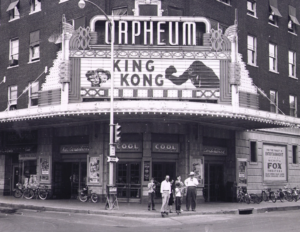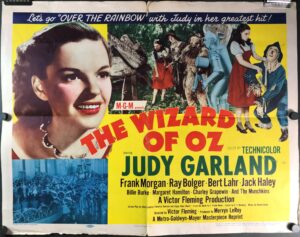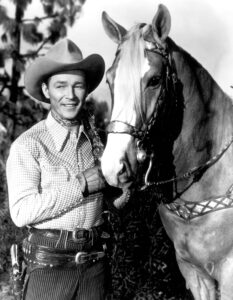1953 Wichita, Kansas

Wylie Aitken
Born on January 4, 1942
Wichita, Kansas
Interviewed on January 30, 2025 by Grace Aitken
GA: What was the first movie you saw in a movie theater?
WA: The first movie I saw in the theater, I had to be in about sixth grade. I don’t know exactly what year but I was born in 1942, so if I do the math it puts it around 1953. I remember it was the Wizard of Oz, which I wanted to see because I loved all of the Oz books. I read them all. I think I gave you all those books but I don’t think any of you ever read them. I also loved the Wizard of Oz especially because Dorothy was from Kansas, and there’s that important line where she says to the dog “We’re not in Kansas anymore.” I used to love that as a kid from Kansas. On Saturday mornings they would have kids days, where they would play Gene Autry westerns and cartoons and other shows like that.

GA: Was the showing of the Wizard of Oz you saw playing on a Saturday morning?
WA: No, no, the Wizard of Oz was kind of a classic, and it still is a classic if you think about it. That movie came out in the 40s, but it was so revered that it would always show up every year at the theater. So I would go down, I made a special effort going down and seeing that movie, because it was from a series of books that were my favorite childhood books. And so I remember that, and I remember that theater was very ornate. Obviously it had concessions. You know, imagine the biggest theater. We now have multiple theaters with many screens. We had no multiple theaters in those days, zero. So you went to one theater that featured one movie, and everything was focused on that. And of course, the lobby did have a tremendous concession stand, and it was very ornate. It was probably one of the most historic buildings in the entire city.
There was a lack of television and the television there was, which many families did not have at all, was black and white with a tiny little screen. So, for entertainment, the big thing was going to the movie theater. That was the most dominant social activity in the entire community. so I would regularly go to the theater. I always loved film. As a little kid, I was just fascinated by film, and so I would go there, and that was really the hub. And every little community had its theater. But then also there were the big theaters like the Orpheum downtown, so that’s where you would go to the big movies like Spartacus or those kinds of movies. Quo Vadis was a big film. And those were always the big films that were being released. And you go to a big theater with a big, huge screen. And then, of course, the local theaters were very nice, but more modest. Some are like the little theaters you see today if you go to theater 21 of the 24 screens, there’ll be a little theater where they’re showing a particular film. But of course there was no multiple theaters at that point in time.
Every town, or at least a good sized city, had this large theater, which had balconies and everything. And of course, most kids wanted to always run up to the balcony because we were less restricted if we were in the balcony, as opposed to being down below, in the in the seatings below, we could be a little more mischievous and do things up there that we wouldn’t want to do among all the adults that are gathered downstairs. I remember you would go and hope a girl would hold your hand. You felt really special if a girl held your hand.
GA: Do you know if the theater is still standing?
WA: I do not. I would not be surprised if it is. I know the one in St. Louis is, and I wouldn’t be surprised if the one in Wichita was, but I you know what, I haven’t checked that out in a long time.
GA: Who was with you when you saw the movie? Do you remember?
WA: Yes, it would be my best friend, Dick Finn. I always talk about Wichita as my Tom Sawyer/Huck Finn years, and so he was the Tom Sawyer to my Huck Finn. And name was Dick Finn. We remained friends for our entire life, even though I left in ’55 and he stayed, we stayed in touch. I was, I actually saw him, sadly enough, when he was in the hospital, when he was dying. We didn’t think he was dying, but that’s what ultimately happened.
GA: What year was that?
WA: Gosh, when he died? Probably, oh, I would say seven, eight years ago.
GA: I’m sorry.
WA: Yeah, well, you know, it happens. It’s life. It’s a process, and it’s always moving.
GA: Did you guys take the bus to the theater?
WA: Oh, yeah, and paid our nickel, or whatever it was, and went to see the movie. And the movie, I think cost a quarter.
GA: Did your parents give you the quarter? Or did you make it yourself at that time?
WA: Probably at that time, I didn’t. I would get it from Mom, but I was a good kid about going out to baseball games and all these things and selling pop. I guess I’d buy pop at the store, put it in a little red wagon, and then go out to the field where they had all the little league games. There’d be all these little league games. There was a field at the public high school. They had like, six or seven fields, you know, so you could have all these games all going on at the same time, with all the parents coming out to watch their kids play Little League Baseball. And I take out a little red wagon, and I’d go to the store and buy a bunch of pop, you know, for five cents for a Coke or whatever, and sell it for 10 cents. I would sell out, and that’s how I made extra money.
GA: Did you buy anything at the concession when you saw this movie?
WA: I’m sure I did. The big items would have been, of course, popcorn, cotton candy. And the other item that was there was a bar called the Holloway bar. And there was also another competitor called Sugar Daddies. And I would buy the Holloway bar because it was a bar that you would lick, just like the Sugar Daddy. But it would last the whole movie. So I’m coming from a very modest family with a very modest budget, I would tend to buy the Holloway bar because you could lick that and it would last the whole movie.
GA: Were there ushers at the theater?
WA: Oh yes, there would have been ushers, and they would walk you down, and they would be ones that would tell us to shut up or quit goofing around, and if not we’ll throw you out. They were ushers, and they were also caretakers, or whatever you want to call it, to keep these kids in line.
GA: What do you remember about watching the Wizard of Oz specifically, and how do you remember it making you feel? What did you like or dislike about it?
WA: Well, I loved it because I was an Oz junkie, but what I remember about it was how fascinated I was with it when it went from black and white to color in the middle of the movie. That had not been done before. And I think what really bothered me about it was, as a young kid, it was damn scary. I mean, the Wicked Witch. I remember her to this very day, and now we’re seeing her differently, I guess, in the new movie. But the reality was she was terrible and terrifying. And if you remember the story, she starts out in the movie being like this terrible teacher who’s really upset and wants to take Toto away from Dorothy, and the tornado hits. And then, of course, the same person who was the terrible teacher also ends up being the witch in the movie. And I mean, she was scary. So in many respects, people would kind of warn you that, you know, I think it disturbed a lot of young kids to see this woman doing terrible things to poor Dorothy and Toto, and we were delighted when she was finally melted…She always terrible, she was mean, and all those ugly flying monkeys. They were terrible.
GA: Is there anything else you remember from this time?
WA: I remember with the westerns there was this big debate between who was the better cowboy, Roy Rogers or Gene Autry. I was a big Roy Rogers fan, the “King of the Cowboys.” I loved Roy Rogers and my mom was upset because she loved Gene Autry. She always reminded me that Gene Autry served in the war and Roy Rogers didn’t. And that led Roy Rogers to become a bigger star because he continued to make movies while Gene Autry was serving this country. So she always kind of resented Roy Rogers. Roy Rogers and Trigger.

Note: Wylie Aitken is my paternal grandfather. He lives in Anaheim, California and is a longtime lover of film. When he was young he dreamed of becoming an actor. He ended up a lawyer instead, but still loves Hollywood. He recently met Cillian Murphy, an actor he was ecstatic to talk to due to their shared Irish heritage. The photo of the two of them is framed on his desk alongside photos of his family.
